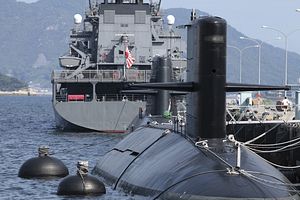Two polls taken this weekend nationwide in Japan suggest that while Prime Minister Shinzo Abe and his Cabinet’s approval rating may have firmed somewhat, after hitting a low in early July, the nation is unsure about some of the recent changes to government policy. The most troubling numbers for Abe have to do with collective self-defense, as a large majority of the population believes it hasn’t been given an adequate explanation for the reinterpretation. As Abe’s summer of diplomacy comes to an end, there are few events on the horizon that he can use to sway popular support, other than attempting to explain his latest views in the press.
The Yomiuri Shimbun and Kyodo News both conducted surveys over the weekend. Both polls found that the Abe Cabinet’s approval rating had bounced back slightly after reaching its lowest levels since taking office in December 2012. The polls in early July were taken right after the Cabinet approved a more normalized interpretation of collective self-defense. The new polls show that the administration’s approval rating improved from 48 to 51 percent for the Yomiuri and from 48 to nearly 50 percent in the Kyodo News. Neither result represents a significant improvement over the large drops seen between June and July.
More disconcerting for Abe are the poll numbers directly concerning collective self-defense. The Kyodo poll showed that 84.1 percent believes the Cabinet’s decision has not been sufficiently explained, while 60.2 percent oppose the exercise of collective self-defense outright, an increase of 5.8 percent from July. The Yomiuri poll showed similar numbers for the Cabinet’s explanation, but only 51 percent opposed the new right.
Additionally, 66 percent of the population is opposed to the next consumption tax increase in October 2015 according to the Yomiuri, and Kyodo reported 57.3 percent are against restarting the country’s nuclear plants. The ruling LDP’s approval stood between 35.9 and 38 percent, but support for the next closest party (the Democratic Party of Japan) was in the single digits.
Despite the Cabinet’s slight ratings improvement, these numbers show Abe’s government has not sufficiently explained or convinced the public on some of its biggest policy objectives. Enshrining the Cabinet’s new interpretation of collective self-defense in the Guidelines for Japan-U.S. Defense Cooperation and pushing through legislation in the LDP-controlled Diet without thorough debate or an election may exacerbate the public’s concern. Similarly, the government has made the restarting of at least some of the country’s nuclear reactors and a second consumption tax increase large components of its economic recovery plan. A public charm offensive to win the public back over to its policies may be in order. However with little in the way of competition in support or ideas from Japan’s opposition parties, the Abe administration may feel it can continue to maintain course with only minor adjustments, playing on the strength of its political hand for as long as possible.

































